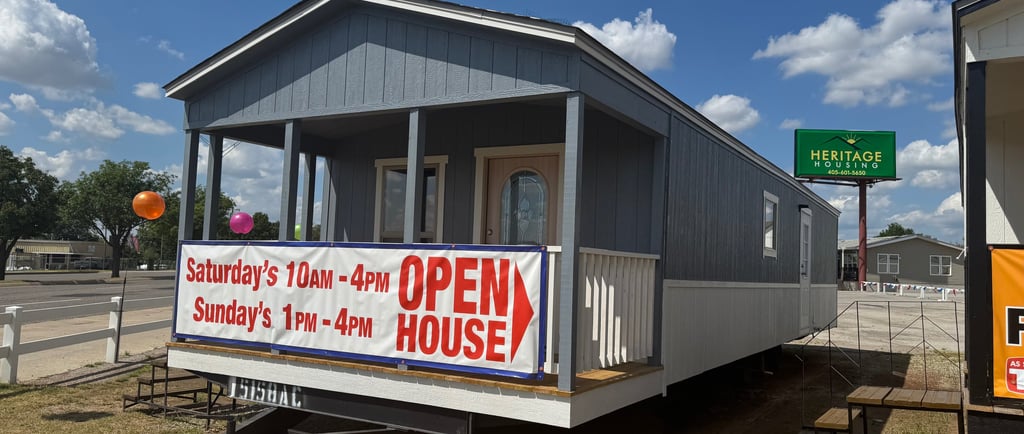The Myth of Mobility:
Why Buying a Mobile Home Can Give You the Same Freedom as Renting (and Way More Benefits)
8/12/20255 min read


When people defend renting, the number one argument you’ll hear is:
“Well, if I rent, I can just get up and leave whenever I want.”
It sounds freeing. No long-term commitments. No strings attached. The idea is that buying a home “ties you down,” while renting keeps you light on your feet.
But here’s the thing—this “mobility” argument is a myth. It’s a half-truth that ignores how real life actually works, and it keeps a lot of people from building wealth, stability, and independence.
The reality? If you own a home—especially a prefabricated, modular, or mobile home—you can have all the same flexibility as a renter, plus the benefits of ownership.
In this article, we’re going to break down why the mobility excuse is overrated, how owning a prefab home can be just as freeing, and why it’s actually the smarter financial and lifestyle choice.
1. The “I Can Leave Anytime” Illusion
Let’s start with the core of the argument.
Renters often say they can “just pack up and go.” But if you’ve ever actually moved out of a rental, you know it’s not like flipping a light switch. You have to:
Wait for your lease to end (or pay hefty fees to break it)
Give 30–60 days’ notice
Coordinate movers, deposits, and utility shut-offs
Hunt for your next place (which takes time and money)
Pay for moving trucks, boxes, and setup fees
That’s not “just leave anytime.” That’s a logistical and financial process.
Meanwhile, if you own a prefab home, you have options. Depending on the type, you can:
Sell it and potentially walk away with a profit
Rent it out and keep it as an income stream
Relocate it (if it’s a manufactured or mobile home)
Use it as a vacation rental when you’re away
Owning doesn’t lock you in—it opens more doors.
2. Mobile Homes Can Literally Move
Here’s where owning a mobile or manufactured home completely flips the script: you can pick up and go.
If your home is built on a chassis (like many manufactured homes), it’s literally designed to be moved. You can take your investment with you instead of walking away from it.
Compare that to renting:
When you move as a renter, you leave your entire living space behind. You start fresh every time—new rent, new deposits, new fees.
When you move as a mobile home owner, you can bring your home with you, the way an RV owner takes their RV across the country.
You don’t lose the place you love. You don’t start over from scratch. And you don’t burn money paying for something you’ll never own.
3. Flexibility Isn’t Just About Location
People think “mobility” only means the ability to move cities quickly. But flexibility comes in many forms:
Financial flexibility (being able to adjust your budget without losing your home)
Lifestyle flexibility (adding space, upgrading finishes, or changing the layout)
Schedule flexibility (deciding when to move, not being forced by a landlord)
Prefab and mobile homes give you all three:
Your payments are often lower than rent for a similar space.
You can remodel or expand without needing anyone’s permission.
You decide when you’re done with your home—not a lease renewal letter.
If anything, renters often have less control over their living situation.
4. Renters Still Face “Forced Mobility”
One of the biggest ironies? Renting can make you more likely to move against your will.
The landlord sells the property? You’re out.
The rent jumps $200 next year? You might not be able to afford to stay.
The building gets turned into condos? Time to find somewhere else.
That’s forced mobility—not the romantic “I’m free to roam” kind.
When you own a prefab home, your housing costs are far more predictable. Your mortgage doesn’t randomly spike because your landlord feels like cashing in.
5. Building Equity Beats Building Nothing
Here’s a harsh truth: every month you rent, you’re paying someone else’s mortgage. You’re helping them build equity while you walk away with nothing.
With a prefab home:
Every payment you make builds your ownership.
Even if you move after a few years, you can sell and recoup some (or all) of what you’ve paid.
In many cases, your property value appreciates, meaning you make money just by living there.
Mobility is nice—but mobility with equity is power.
6. Mobile Homes Lower the Cost of Change
Let’s say you truly are a wanderer. You want the option to live in different cities or neighborhoods over the years.
Renters face high costs every time they move:
First month’s rent
Security deposit
Non-refundable fees
Moving costs
Lost work days
Mobile home owners can:
Move their home and avoid paying for a brand-new living space
Keep the home as a rental in one location while moving themselves elsewhere
Sell the home and make money, instead of paying to leave
It’s not just about the freedom to move—it’s about making moving affordable.
7. Prefab Homes Are Faster to Sell Than You Think
Some people think selling a home is a year-long ordeal. While that can be true for traditional houses, prefab homes often sell quickly—especially in high-demand areas or parks with waiting lists.
And even if you don’t want to sell? You can rent it out in days.
Renters can’t flip a lease into a revenue stream. Owners can.
8. The Emotional Side of Ownership
Mobility isn’t just about changing addresses—it’s about freedom from worry. And renting comes with a lot of hidden stress:
What if my rent goes up?
What if my landlord sells?
What if my neighbors change and it ruins my quality of life?
Owning a mobile home removes most of these unknowns. You’re the decision-maker. You control the terms. That peace of mind is worth far more than the illusion of being able to “leave whenever you want.”
9. You’re Already Tied Down—Might as Well Own Something
Here’s the kicker: most renters aren’t moving every year anyway. The average renter stays put for 3–5 years. That’s basically the same as staying in a home you own—except you walk away empty-handed at the end.
If you’re going to stay somewhere for years, why not build equity, have stability, and still keep the option to move when you want?
10. The Bottom Line
The “mobility” argument for renting sounds nice over coffee, but it doesn’t hold up in real life. Moving is never effortless, whether you rent or own.
The difference is that owning—especially a prefab or mobile home—lets you:
Move and keep your asset
Sell and potentially profit
Avoid rent hikes and forced moves
Customize your space as you please
Build wealth instead of giving it away
Renting is mobility without assets. Owning is mobility with assets.
And when you combine that with the lower costs, modern designs, and relocation potential of prefab and mobile homes, the choice becomes pretty clear:
If you want real freedom, owning a mobile home wins every time.
